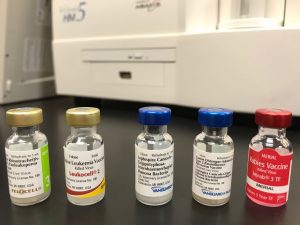Call to schedule your vaccination appointment: 530-888-8788
The vaccination of puppies (puppy shots) is one of the crucial steps in assuring the puppy will have a healthy and happy puppyhood. The who, what, why, when, where, and how of vaccinations are complicated, and may vary from puppy to puppy. Always consult with your veterinarian to determine which vaccines are appropriate for your puppy. To better understand vaccines, it is important to understand how the puppy is protected from disease during the first few weeks of its life. Protection from the mother (maternal antibodies)
A newborn puppy is not naturally immune to diseases. However, it does have some antibody protection which is derived from its mother’s milk. 98% of the puppy’s immunity is from antibodies derived from the first milk. This is the milk produced around the time of birth. This antibody-rich milk is called colostrum. The puppy does not continue to receive antibodies through its mother’s milk. It only absorbs antibodies from colostrum for 12-24 hours after birth. All antibodies derived from the mother are called maternal antibodies. It must be noted that the puppy will only receive antibodies against diseases to which the mother had been recently vaccinated or exposed. As an example, a mother that had NOT been vaccinated against or exposed to parvovirus, would not have any antibodies against parvovirus to pass along to her puppies. The puppies then would be susceptible to developing a parvovirus infection.
Window of susceptibility
The age at which puppies can effectively be immunized (protected) is proportional to the number of antibodies the puppy received from its mother. High levels of maternal antibodies present in the puppies’ bloodstream will block the effectiveness of a vaccine. When the maternal antibodies drop to a low enough level in the puppy, immunization by a commercial vaccine will work.
The antibodies from the mother generally circulate in the newborn’s blood for a number of weeks. There is a period of time from several days to several weeks in which the maternal antibodies are too low to provide protection against the disease, but too high to allow a vaccine to work. This period is called the window of susceptibility. This is the time when despite being vaccinated, a puppy or kitten can still contract the disease.
When should puppies be vaccinated?
The length and timing of the window of susceptibility are different in every litter, and even between individuals in a litter. A study of a cross-section of different puppies showed that the age at which they were able to respond to a vaccine and develop protection (become immunized) covered a wide period of time. At six weeks of age, 25% of the puppies could be immunized. At 9 weeks of age, 40% of the puppies were able to respond to the vaccine. The number increased to 60% by 16 weeks of age, and by 18 weeks, 95% of the puppies were protected by the vaccine.
Almost all researchers agree that for puppies and kittens, we need to give at least three combination vaccinations and repeat these at one year of age.
Against which diseases should puppies be vaccinated?
The AVMA Council on Biologic and Therapeutic Agents’ Report on Cat and Dog Vaccines has recommended that the core vaccines for dogs include distemper, canine adenovirus-2 (hepatitis and respiratory disease), canine parvovirus-2, and rabies.
Noncore vaccines include leptospirosis, coronavirus, canine parainfluenza, and Bordetella bronchiseptica (both are causes of ‘kennel cough‘), and Borrelia burgdorferi (which causes Lyme Disease). Consult with your veterinarian to select the proper vaccines for your puppy.

